Slow train provides convenience for local villagers in SW China

The 5647 train passes a bridge in Weining County, southwest China's Guizhou Province, Dec. 1, 2021. In 2003, the 5648/5647 train linking Zhaotong City, southwest China's Yunnan Province, with Guiyang City, southwest China's Guizhou Province, was put into use. With an average speed of 40 km per hour, the train stops at 18 stations along the way. The entire journey of 407 km takes 9 hours and 31 minutes. Local villagers see the "slow train" as a cost-effective and reliable way to travel to sell their farming produce to the world outside of the mountains. Efforts have also been taken by railway departments to help villagers sell apples, including promoting apples in the train by radio and adding an additional luggage carriage to store apples. With low ticket fares, the train has been running for 18 years and is beloved by local villagers. (Xinhua/Yang Wenbin)
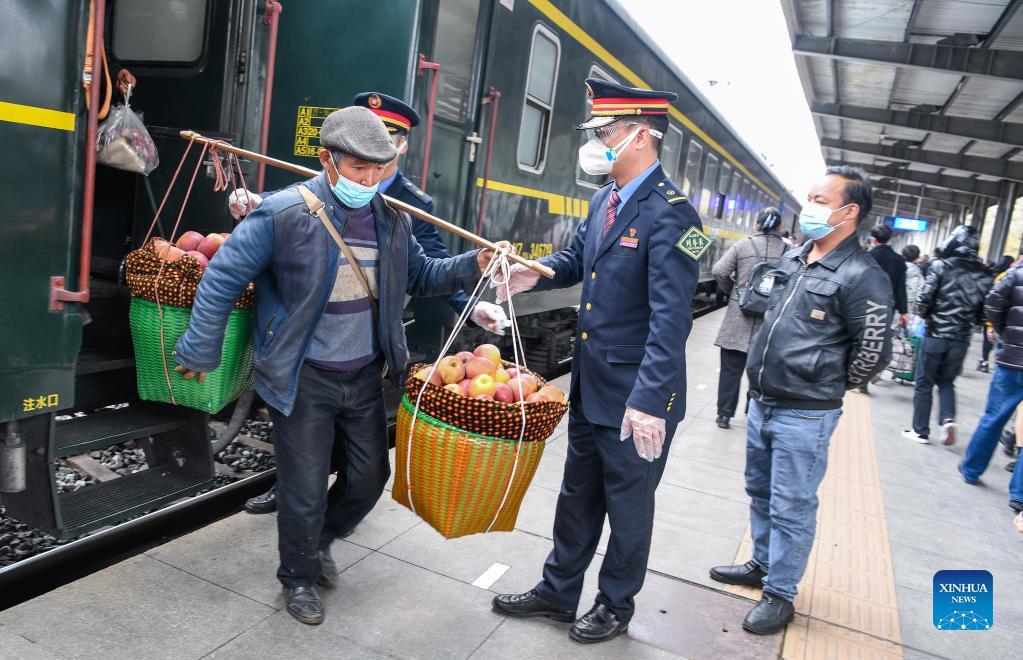
A villager shouldering apples for sale arrives at Caohai Station in southwest China's Guizhou Province, Nov. 30, 2021. In 2003, the 5648/5647 train linking Zhaotong City, southwest China's Yunnan Province, with Guiyang City, southwest China's Guizhou Province, was put into use. With an average speed of 40 km per hour, the train stops at 18 stations along the way. The entire journey of 407 km takes 9 hours and 31 minutes. Local villagers see the "slow train" as a cost-effective and reliable way to travel to sell their farming produce to the world outside of the mountains. Efforts have also been taken by railway departments to help villagers sell apples, including promoting apples in the train by radio and adding an additional luggage carriage to store apples. With low ticket fares, the train has been running for 18 years and is beloved by local villagers. (Xinhua/Yang Wenbin)

The 5647 train arrives at Caohai Station in southwest China's Guizhou Province, Nov. 30, 2021. In 2003, the 5648/5647 train linking Zhaotong City, southwest China's Yunnan Province, with Guiyang City, southwest China's Guizhou Province, was put into use. With an average speed of 40 km per hour, the train stops at 18 stations along the way. The entire journey of 407 km takes 9 hours and 31 minutes. Local villagers see the "slow train" as a cost-effective and reliable way to travel to sell their farming produce to the world outside of the mountains. Efforts have also been taken by railway departments to help villagers sell apples, including promoting apples in the train by radio and adding an additional luggage carriage to store apples. With low ticket fares, the train has been running for 18 years and is beloved by local villagers. (Xinhua/Yang Wenbin)
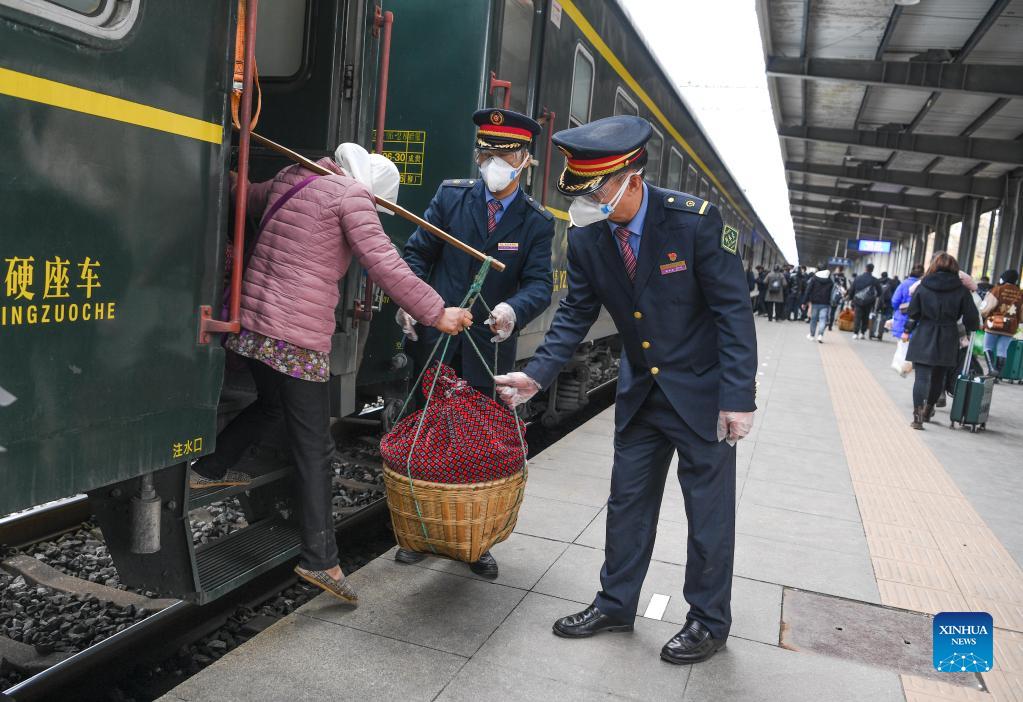
A villager shouldering apples for sale arrives at Caohai Station in southwest China's Guizhou Province, Nov. 30, 2021. In 2003, the 5648/5647 train linking Zhaotong City, southwest China's Yunnan Province, with Guiyang City, southwest China's Guizhou Province, was put into use. With an average speed of 40 km per hour, the train stops at 18 stations along the way. The entire journey of 407 km takes 9 hours and 31 minutes. Local villagers see the "slow train" as a cost-effective and reliable way to travel to sell their farming produce to the world outside of the mountains. Efforts have also been taken by railway departments to help villagers sell apples, including promoting apples in the train by radio and adding an additional luggage carriage to store apples. With low ticket fares, the train has been running for 18 years and is beloved by local villagers. (Xinhua/Yang Wenbin)
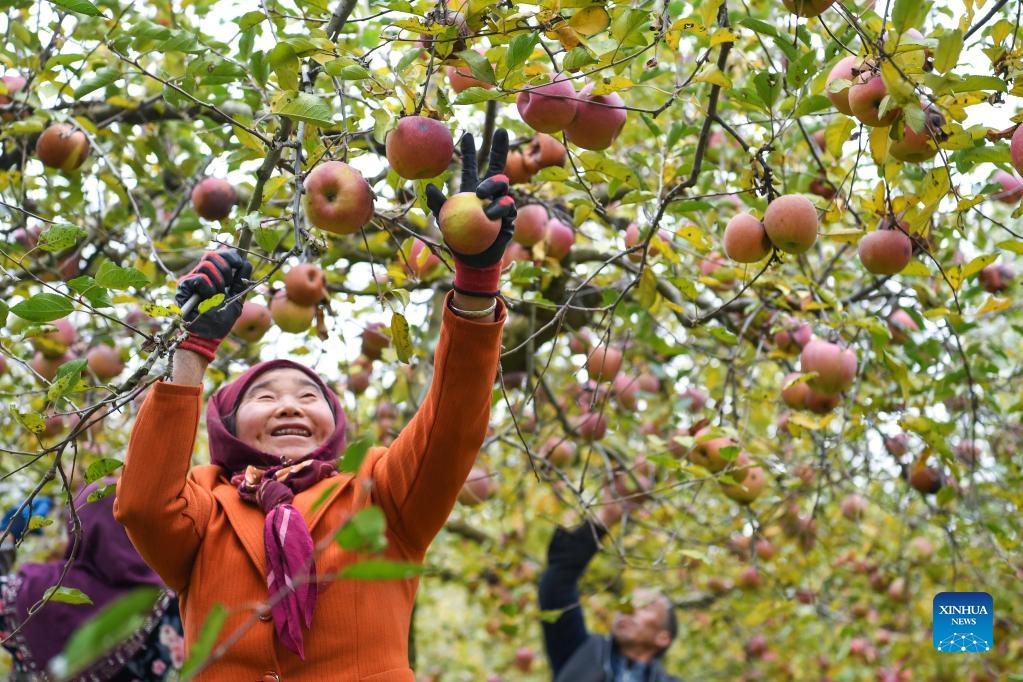
Villagers pick apples at Xiaolongdong Village of Xiaolongdong Township in Zhaotong City, southwest China's Yunnan Province, Nov. 29, 2021. In 2003, the 5648/5647 train linking Zhaotong City, southwest China's Yunnan Province, with Guiyang City, southwest China's Guizhou Province, was put into use. With an average speed of 40 km per hour, the train stops at 18 stations along the way. The entire journey of 407 km takes 9 hours and 31 minutes. Local villagers see the "slow train" as a cost-effective and reliable way to travel to sell their farming produce to the world outside of the mountains. Efforts have also been taken by railway departments to help villagers sell apples, including promoting apples in the train by radio and adding an additional luggage carriage to store apples. With low ticket fares, the train has been running for 18 years and is beloved by local villagers. (Xinhua/Yang Wenbin)

The 5647 train departs from Caohai Station in southwest China's Guizhou Province, Nov. 30, 2021. In 2003, the 5648/5647 train linking Zhaotong City, southwest China's Yunnan Province, with Guiyang City, southwest China's Guizhou Province, was put into use. With an average speed of 40 km per hour, the train stops at 18 stations along the way. The entire journey of 407 km takes 9 hours and 31 minutes. Local villagers see the "slow train" as a cost-effective and reliable way to travel to sell their farming produce to the world outside of the mountains. Efforts have also been taken by railway departments to help villagers sell apples, including promoting apples in the train by radio and adding an additional luggage carriage to store apples. With low ticket fares, the train has been running for 18 years and is beloved by local villagers. (Xinhua/Yang Wenbin)

A family take the 5647 train to Liupanshui City of southwest China's Guizhou Province, Nov. 30, 2021. In 2003, the 5648/5647 train linking Zhaotong City, southwest China's Yunnan Province, with Guiyang City, southwest China's Guizhou Province, was put into use. With an average speed of 40 km per hour, the train stops at 18 stations along the way. The entire journey of 407 km takes 9 hours and 31 minutes. Local villagers see the "slow train" as a cost-effective and reliable way to travel to sell their farming produce to the world outside of the mountains. Efforts have also been taken by railway departments to help villagers sell apples, including promoting apples in the train by radio and adding an additional luggage carriage to store apples. With low ticket fares, the train has been running for 18 years and is beloved by local villagers. (Xinhua/Yang Wenbin)
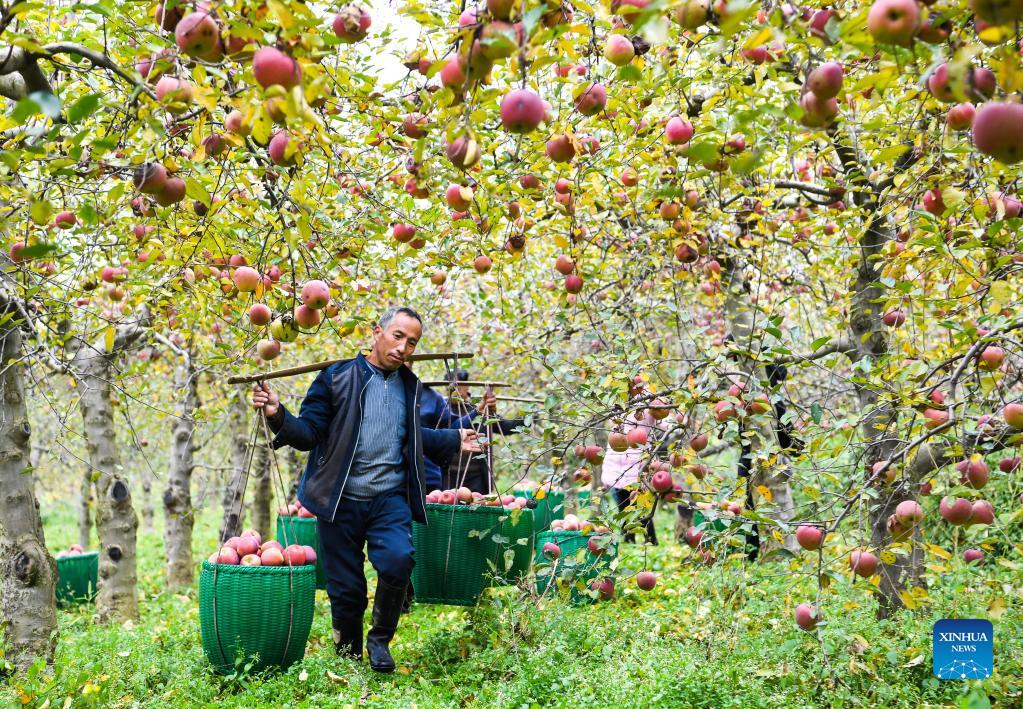
Villagers transport apples at Xiaolongdong Village of Xiaolongdong Township in Zhaotong City, southwest China's Yunnan Province, Nov. 29, 2021. In 2003, the 5648/5647 train linking Zhaotong City, southwest China's Yunnan Province, with Guiyang City, southwest China's Guizhou Province, was put into use. With an average speed of 40 km per hour, the train stops at 18 stations along the way. The entire journey of 407 km takes 9 hours and 31 minutes. Local villagers see the "slow train" as a cost-effective and reliable way to travel to sell their farming produce to the world outside of the mountains. Efforts have also been taken by railway departments to help villagers sell apples, including promoting apples in the train by radio and adding an additional luggage carriage to store apples. With low ticket fares, the train has been running for 18 years and is beloved by local villagers. (Xinhua/Yang Wenbin)
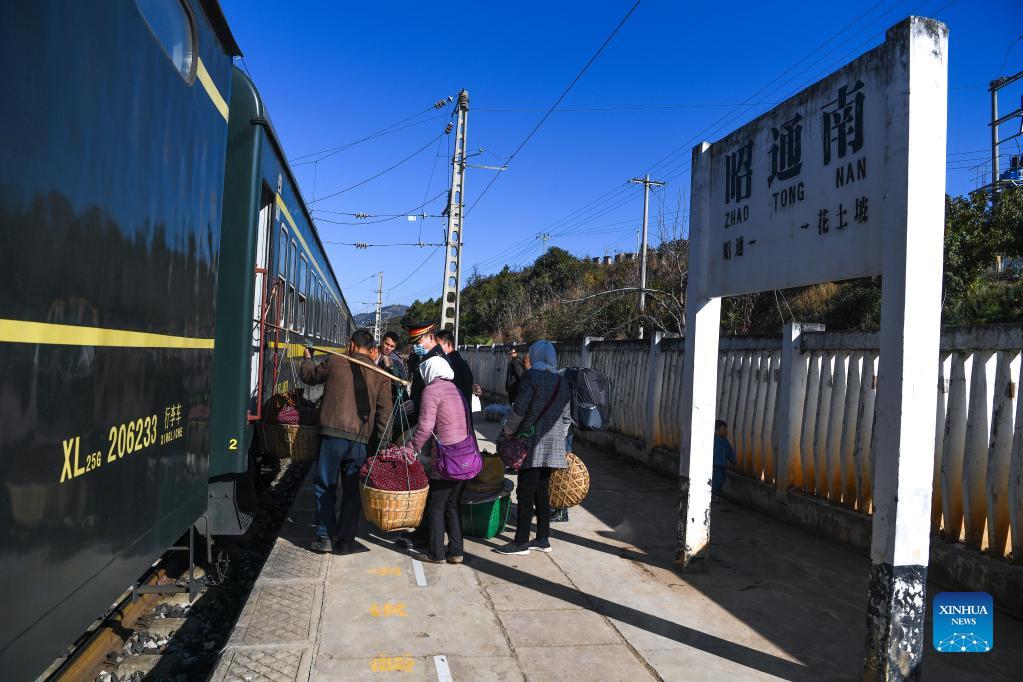
Villagers board the 5647 train with apples at Zhaotong South Station in southwest China's Yunnan Province, Nov. 30, 2021. In 2003, the 5648/5647 train linking Zhaotong City, southwest China's Yunnan Province, with Guiyang City, southwest China's Guizhou Province, was put into use. With an average speed of 40 km per hour, the train stops at 18 stations along the way. The entire journey of 407 km takes 9 hours and 31 minutes. Local villagers see the "slow train" as a cost-effective and reliable way to travel to sell their farming produce to the world outside of the mountains. Efforts have also been taken by railway departments to help villagers sell apples, including promoting apples in the train by radio and adding an additional luggage carriage to store apples. With low ticket fares, the train has been running for 18 years and is beloved by local villagers. (Xinhua/Yang Wenbin)
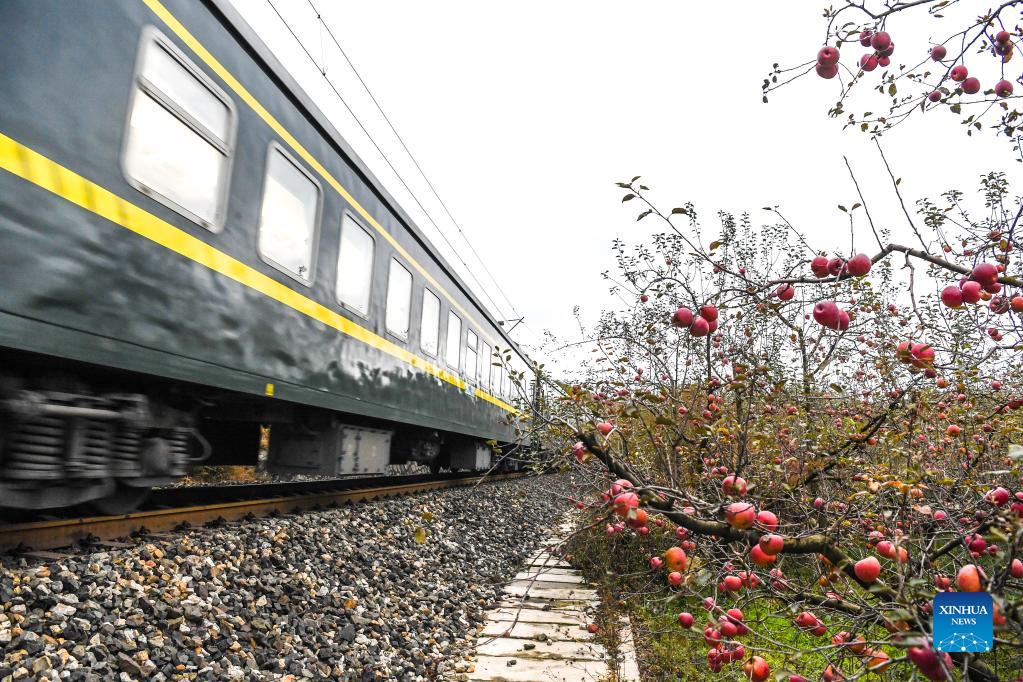
A slow train passes by an apple orchard at Xiaolongdong Village of Xiaolongdong Township in Zhaotong City, southwest China's Yunnan Province, Nov. 29, 2021. In 2003, the 5648/5647 train linking Zhaotong City, southwest China's Yunnan Province, with Guiyang City, southwest China's Guizhou Province, was put into use. With an average speed of 40 km per hour, the train stops at 18 stations along the way. The entire journey of 407 km takes 9 hours and 31 minutes. Local villagers see the "slow train" as a cost-effective and reliable way to travel to sell their farming produce to the world outside of the mountains. Efforts have also been taken by railway departments to help villagers sell apples, including promoting apples in the train by radio and adding an additional luggage carriage to store apples. With low ticket fares, the train has been running for 18 years and is beloved by local villagers. (Xinhua/Yang Wenbin)

A villager displays an apple for sale on the 5647 train running between Zhaotong in southwest China's Yunnan Province and Guiyang in southwest China's Guizhou Province, Nov. 30, 2021. In 2003, the 5648/5647 train linking Zhaotong City, southwest China's Yunnan Province, with Guiyang City, southwest China's Guizhou Province, was put into use. With an average speed of 40 km per hour, the train stops at 18 stations along the way. The entire journey of 407 km takes 9 hours and 31 minutes. Local villagers see the "slow train" as a cost-effective and reliable way to travel to sell their farming produce to the world outside of the mountains. Efforts have also been taken by railway departments to help villagers sell apples, including promoting apples in the train by radio and adding an additional luggage carriage to store apples. With low ticket fares, the train has been running for 18 years and is beloved by local villagers. (Xinhua/Yang Wenbin)

Villagers load apples at Xiaolongdong Village of Xiaolongdong Township in Zhaotong City, southwest China's Yunnan Province, Nov. 29, 2021. In 2003, the 5648/5647 train linking Zhaotong City, southwest China's Yunnan Province, with Guiyang City, southwest China's Guizhou Province, was put into use. With an average speed of 40 km per hour, the train stops at 18 stations along the way. The entire journey of 407 km takes 9 hours and 31 minutes. Local villagers see the "slow train" as a cost-effective and reliable way to travel to sell their farming produce to the world outside of the mountains. Efforts have also been taken by railway departments to help villagers sell apples, including promoting apples in the train by radio and adding an additional luggage carriage to store apples. With low ticket fares, the train has been running for 18 years and is beloved by local villagers. (Xinhua/Yang Wenbin)
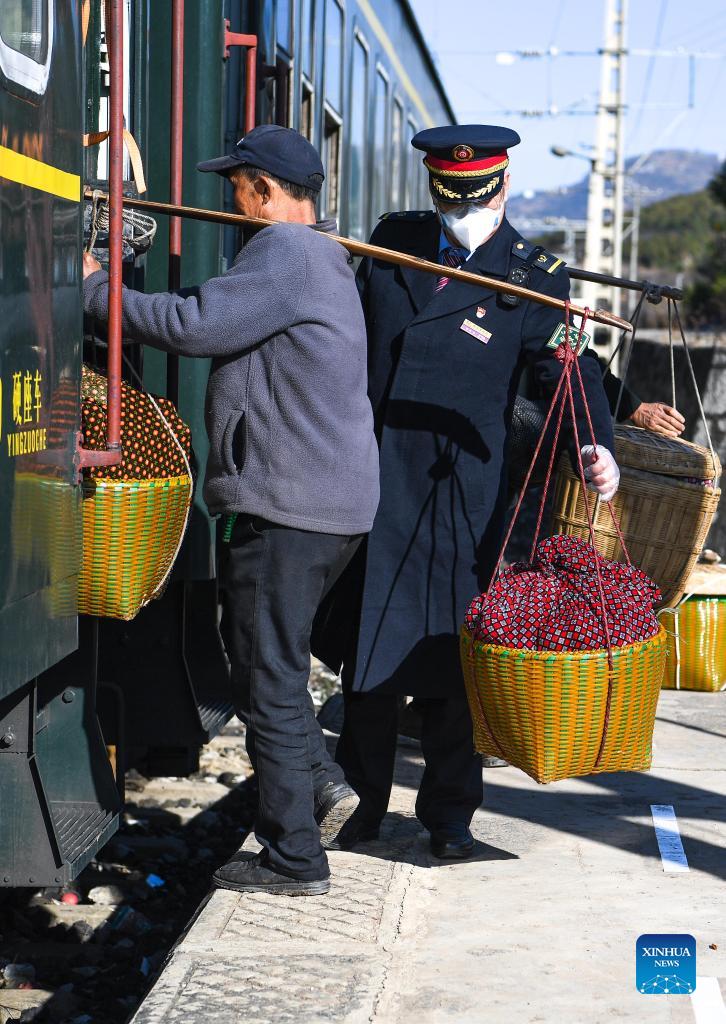
A villager boards the 5647 train with apples at Zhaotong South Station in southwest China's Yunnan Province, Nov. 30, 2021. In 2003, the 5648/5647 train linking Zhaotong City, southwest China's Yunnan Province, with Guiyang City, southwest China's Guizhou Province, was put into use. With an average speed of 40 km per hour, the train stops at 18 stations along the way. The entire journey of 407 km takes 9 hours and 31 minutes. Local villagers see the "slow train" as a cost-effective and reliable way to travel to sell their farming produce to the world outside of the mountains. Efforts have also been taken by railway departments to help villagers sell apples, including promoting apples in the train by radio and adding an additional luggage carriage to store apples. With low ticket fares, the train has been running for 18 years and is beloved by local villagers. (Xinhua/Yang Wenbin)
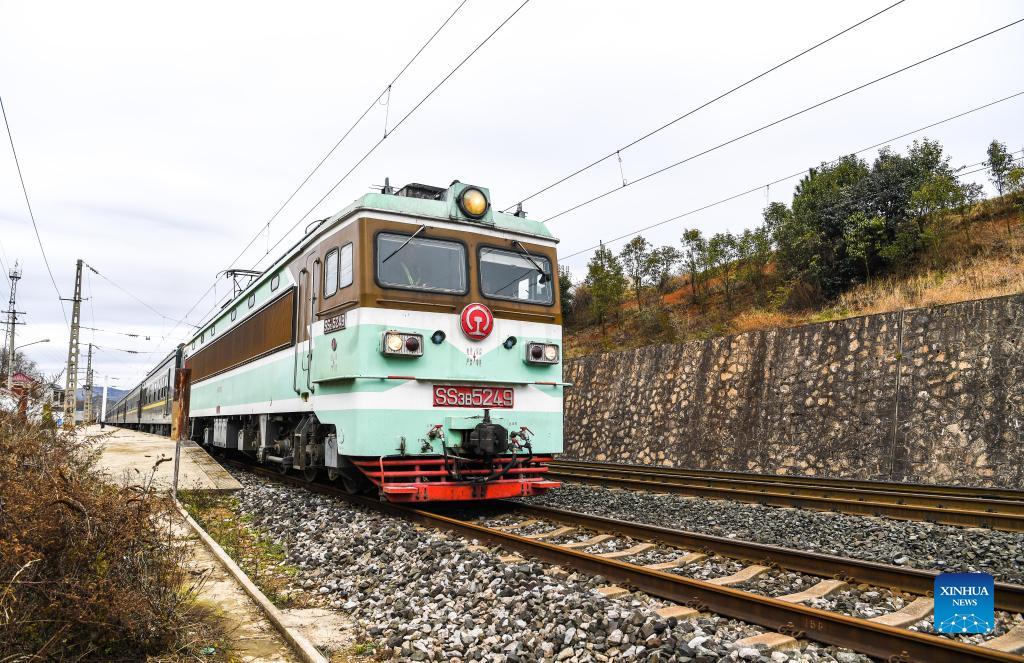
The 5647 train arrives at Zhuga Station in Weining County, southwest China's Guizhou Province, Nov. 30, 2021. In 2003, the 5648/5647 train linking Zhaotong City, southwest China's Yunnan Province, with Guiyang City, southwest China's Guizhou Province, was put into use. With an average speed of 40 km per hour, the train stops at 18 stations along the way. The entire journey of 407 km takes 9 hours and 31 minutes. Local villagers see the "slow train" as a cost-effective and reliable way to travel to sell their farming produce to the world outside of the mountains. Efforts have also been taken by railway departments to help villagers sell apples, including promoting apples in the train by radio and adding an additional luggage carriage to store apples. With low ticket fares, the train has been running for 18 years and is beloved by local villagers. (Xinhua/Yang Wenbin)
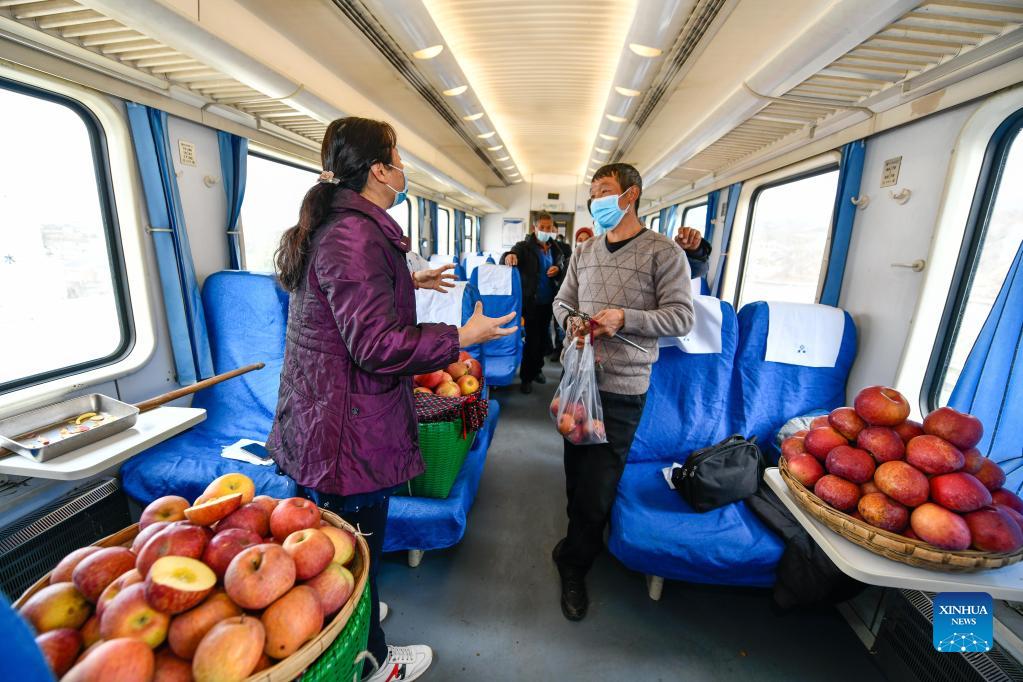
A villager sells apples on the 5647 train running between Zhaotong in southwest China's Yunnan Province and Guiyang in southwest China's Guizhou Province, Nov. 30, 2021. In 2003, the 5648/5647 train linking Zhaotong City, southwest China's Yunnan Province, with Guiyang City, southwest China's Guizhou Province, was put into use. With an average speed of 40 km per hour, the train stops at 18 stations along the way. The entire journey of 407 km takes 9 hours and 31 minutes. Local villagers see the "slow train" as a cost-effective and reliable way to travel to sell their farming produce to the world outside of the mountains. Efforts have also been taken by railway departments to help villagers sell apples, including promoting apples in the train by radio and adding an additional luggage carriage to store apples. With low ticket fares, the train has been running for 18 years and is beloved by local villagers. (Xinhua/Yang Wenbin)

A passenger shows her ticket on the 5647 train running between Zhaotong in southwest China's Yunnan Province and Guiyang in southwest China's Guizhou Province, Nov. 30, 2021. In 2003, the 5648/5647 train linking Zhaotong City, southwest China's Yunnan Province, with Guiyang City, southwest China's Guizhou Province, was put into use. With an average speed of 40 km per hour, the train stops at 18 stations along the way. The entire journey of 407 km takes 9 hours and 31 minutes. Local villagers see the "slow train" as a cost-effective and reliable way to travel to sell their farming produce to the world outside of the mountains. Efforts have also been taken by railway departments to help villagers sell apples, including promoting apples in the train by radio and adding an additional luggage carriage to store apples. With low ticket fares, the train has been running for 18 years and is beloved by local villagers. (Xinhua/Yang Wenbin)

A villager (R) from Zhaotong, southwest China's Yunnan Province, sells apples in Weining County, southwest China's Guizhou Province, Nov. 30, 2021. In 2003, the 5648/5647 train linking Zhaotong City, southwest China's Yunnan Province, with Guiyang City, southwest China's Guizhou Province, was put into use. With an average speed of 40 km per hour, the train stops at 18 stations along the way. The entire journey of 407 km takes 9 hours and 31 minutes. Local villagers see the "slow train" as a cost-effective and reliable way to travel to sell their farming produce to the world outside of the mountains. Efforts have also been taken by railway departments to help villagers sell apples, including promoting apples in the train by radio and adding an additional luggage carriage to store apples. With low ticket fares, the train has been running for 18 years and is beloved by local villagers. (Xinhua/Yang Wenbin)

Passengers are seen on the 5647 train running between Zhaotong in southwest China's Yunnan Province and Guiyang in southwest China's Guizhou Province, Nov. 30, 2021. In 2003, the 5648/5647 train linking Zhaotong City, southwest China's Yunnan Province, with Guiyang City, southwest China's Guizhou Province, was put into use. With an average speed of 40 km per hour, the train stops at 18 stations along the way. The entire journey of 407 km takes 9 hours and 31 minutes. Local villagers see the "slow train" as a cost-effective and reliable way to travel to sell their farming produce to the world outside of the mountains. Efforts have also been taken by railway departments to help villagers sell apples, including promoting apples in the train by radio and adding an additional luggage carriage to store apples. With low ticket fares, the train has been running for 18 years and is beloved by local villagers. (Xinhua/Yang Wenbin)
Photos
Related Stories
- China's Guizhou to invest over 50 bln yuan in new infrastructure
- Yangbaoshan bridge in SW China carries out static load test
- Feature: Early years enrichment for children in China's most remote areas
- China's Guizhou offers millions in e-coupons to boost tourism
- Scenery of Kuankuoshui national nature reserve in Guizhou
Copyright © 2021 People's Daily Online. All Rights Reserved.










